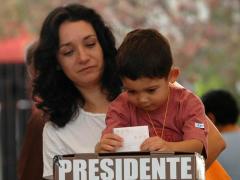Illegal Status Hinders Mexican Voting Bloc
A potentially powerful expatriate voting bloc likely will have little effect on Mexico's presidential race because of the illegal status of many who live in the United States. Thousands of Mexican expatriates streamed into border towns Sunday to vote in their homeland's elections and others were allowed to cast absentee ballots for the first time. Still, many more were disenfranchised by their fear of crossing the border as undocumented residents. "I really wanted to vote, but I don't have papers so I couldn't go to Mexico" to get a voter card, said Adriana Lopez, 27, a housewife and illegal immigrant in Orange County, south of Los Angeles. Still, others expressed hope that more would participate next time. "The main thing is, the door has been opened" for expatriates to vote, Jesus Hernandez, 47, one of only 13,500 Mexicans in California who sent in ballots. "Later, we can reconstruct the procedures to make it easier in the future."
Mexico's presidential candidates: Andres Manuel Lopez Obrador, Felipe Calderon and Roberto Madrazo When Mexico's congress passed a law last year extending suffrage to expatriates, Mexicans in the U.S. hailed it as overdue recognition of the billions of dollars they send home every year. Their elation faded, however, when they learned that voters would need a current electoral card, and that the application deadline was nearly six months before the election. Furthermore, anyone needing a new card had to apply in Mexico - a risky chore for an illegal immigrant. "They couldn't go to Tijuana to get their voting card ... so now they can't vote here or there," said Eduardo Ruiz, president of the Los Angeles-based Federacion de Aguas Calientes, which organized weekly trips to Tijuana last year to help people apply. Of the estimated 4.2 million eligible Mexican voters living abroad, only about 41,000, or 1 percent, requested absentee ballots. Mexicans said the new president could play a vital role in helping millions of undocumented workers obtain legal residency. Outgoing President Vicente Fox traveled to the United States in recent months to encourage Congress to reform immigration policy. "It's important for the new president to fight for rights for Mexicans in this country," said Araceli Rodriguez, of Florida City, Fla., who voted with an absentee ballot. "We're always fighting hard to make it, but we've been living under more pressure, more strain." Some expatriates argue that more could be done to help them vote. "If they really wanted us to vote, they would let us do it at a consulate," said Gustino Fermin, 47, who said he didn't have time to return to Mexico for a voting card. Patricio Ballados, expatriate vote coordinator for Mexico's Federal Electoral Institute, said the agency would consider recommending to Congress that Mexican nationals be allowed to renew their voting cards at consulates. Apathy also is an issue. Some said that they came to the United States because Mexican governments has failed to create economic opportunities at home, and that they didn't see that changing anytime soon. "No matter who they elect, the corruption will continue," said Amelia Juantes, 23, who didn't even attempt to get an absentee ballot.
"If they really wanted us to vote, they would let us do it at a consulate," said Gustino Fermin, 47, who said he didn't have time to return to Mexico for a voting card. Patricio Ballados, expatriate vote coordinator for Mexico's Federal Electoral Institute, said the agency would consider recommending to Congress that Mexican nationals be allowed to renew their voting cards at consulates. Apathy also is an issue. Some said that they came to the United States because Mexican governments has failed to create economic opportunities at home, and that they didn't see that changing anytime soon. "No matter who they elect, the corruption will continue," said Amelia Juantes, 23, who didn't even attempt to get an absentee ballot.

 "If they really wanted us to vote, they would let us do it at a consulate," said Gustino Fermin, 47, who said he didn't have time to return to Mexico for a voting card. Patricio Ballados, expatriate vote coordinator for Mexico's Federal Electoral Institute, said the agency would consider recommending to Congress that Mexican nationals be allowed to renew their voting cards at consulates. Apathy also is an issue. Some said that they came to the United States because Mexican governments has failed to create economic opportunities at home, and that they didn't see that changing anytime soon. "No matter who they elect, the corruption will continue," said Amelia Juantes, 23, who didn't even attempt to get an absentee ballot.
"If they really wanted us to vote, they would let us do it at a consulate," said Gustino Fermin, 47, who said he didn't have time to return to Mexico for a voting card. Patricio Ballados, expatriate vote coordinator for Mexico's Federal Electoral Institute, said the agency would consider recommending to Congress that Mexican nationals be allowed to renew their voting cards at consulates. Apathy also is an issue. Some said that they came to the United States because Mexican governments has failed to create economic opportunities at home, and that they didn't see that changing anytime soon. "No matter who they elect, the corruption will continue," said Amelia Juantes, 23, who didn't even attempt to get an absentee ballot.
































<< Home